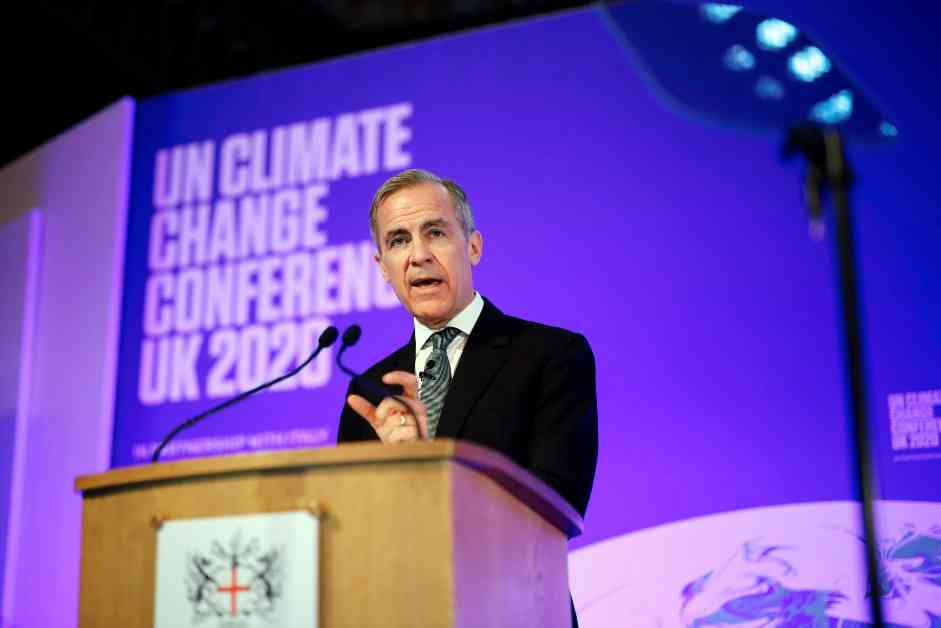In April 2021, the largest climate finance coalition was formed by global banks and smaller lenders, led by the UK as host of the COP26 climate summit. This coalition, known as the Net Zero Banking Alliance (NZBA), aimed to redirect investment away from polluting industries towards climate solutions like renewable energy. The members committed to setting science-based goals to achieve net zero emissions by 2050. Mark Carney, UN special envoy and former central banker, praised the initiative as a breakthrough in climate finance to mobilize trillions of dollars for a low-carbon economy.
Fast forward four years, and the once promising alliance is facing a crisis. A growing number of influential members have withdrawn, citing various reasons. The exodus began with the departure of Goldman Sachs in December 2021, followed by other top US banks like JPMorgan, Citigroup, Bank of America, and Morgan Stanley. Canadian and Australian banks soon followed suit, raising questions about the coalition’s credibility and real-world impact.
The Flight of Major Players
The departure of major banks from the NZBA has been attributed to political pressure, particularly from the US, where the return of a pro-fossil fuel administration under Donald Trump has shifted priorities. Republican officials launched investigations into allegations of collusion among US banks under the NZBA to restrict credit access for fossil fuel companies. The political climate in Washington further fueled the narrative of banks imposing radical ESG goals on American companies.
Brian O’Hanlon, managing director of the climate finance program at RMI, a US-based think tank, highlighted the political context surrounding the banks’ participation and subsequent withdrawal from the coalition. The shift in government administrations and pressure to align with European sustainability standards played a significant role in the decision-making process for these financial institutions.
Challenges and Criticisms
Despite the lofty goals of the NZBA, critics argue that the alliance has not lived up to its promise of accelerating the transition to a low-carbon economy. The voluntary nature of the commitments allowed banks to set targets without clear policies or mechanisms for accountability, leading to questions about their actual commitment to reducing emissions. Reports indicate that while some member banks increased their fossil fuel deals after joining the coalition, others failed to divest from polluting companies or engage in meaningful emission-cutting measures.
European banks, while reducing their overall exposure to fossil fuels, did not demonstrate a significant difference in behavior compared to non-NZBA members. The European Central Bank’s study suggested that private-sector initiatives like the NZBA may have limited impact on decarbonization without strong government regulations to support net zero commitments.
The Future of the Coalition
As the NZBA grapples with the departure of key players and questions about its effectiveness, remaining members are divided on the path forward. Some members advocate for raising the bar on emissions reduction requirements, while others seek to maintain the status quo. The internal debate within the coalition reflects a broader struggle to define its purpose and relevance in the face of changing political landscapes and evolving climate priorities.
The steering group, comprised of progressive lenders and top fossil fuel financiers, faces a critical decision in the coming months. The departure of US banks presents an opportunity for the coalition to redefine its goals and strengthen commitments to climate action. However, challenges remain in aligning the diverse interests of member banks and navigating the evolving regulatory landscape that shapes the economic case for sustainable finance.
In conclusion, the NZBA stands at a crossroads, with significant implications for the future of climate finance. The decisions made in the coming months will determine whether the coalition can regain its footing and emerge as a driving force in the transition to a low-carbon economy. As the world grapples with the urgent need for climate action, the fate of the NZBA serves as a microcosm of the broader challenges and opportunities facing the financial sector in the fight against climate change.














